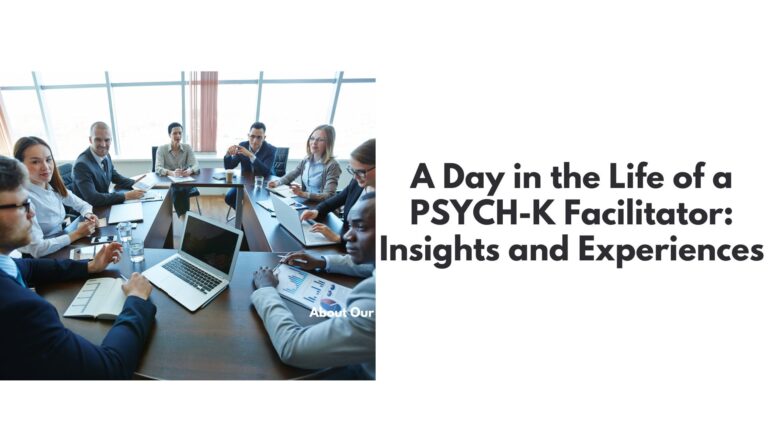Introduction
In the realm of personal development and self-improvement, various techniques and modalities promise to unlock human potential and promote mental well-being. One such method is PSYCH-K, a unique approach that blends psychology and kinesiology to help individuals transform limiting beliefs into empowering ones. A PSYCH-K Facilitator plays a crucial role in guiding clients through this transformative process. This article delves into a day in the life of a PSYCH-K Facilitator, offering insights into their experiences, challenges, and the profound impact they have on their clients’ lives.
Morning Routine: Setting the Tone for the Day
A typical day for a PSYCH-K Facilitator starts with a focus on personal well-being and mental clarity. Many facilitators begin their mornings with practices that help them center themselves, such as meditation, yoga, or journaling. This personal time is essential for maintaining the high level of awareness and presence required to effectively assist their clients.
For instance, Jane, a seasoned PSYCH-K Facilitator, starts her day with a 20-minute meditation session followed by a healthy breakfast. “It’s important for me to be in a balanced state before I start working with clients,” she explains. “This morning routine helps me to clear my mind and set positive intentions for the day.”
Preparing for Sessions: Customizing the Approach
After the morning routine, the facilitator reviews their schedule for the day. Each client is unique, with different needs and goals. Therefore, preparation involves reviewing previous session notes and tailoring the upcoming session to address specific issues. This might include selecting appropriate PSYCH-K processes, such as belief change protocols or goal-setting exercises.
John, another experienced facilitator, emphasizes the importance of this preparatory phase. “Each client session is a journey,” he says. “Understanding their history and current challenges allows me to create a customized approach that is most effective for them.”
Client Sessions: The Heart of the Day
The core of a PSYCH-K Facilitator’s day revolves around client sessions. These sessions typically last between 60 to 90 minutes and can be conducted in person or online. The facilitator begins by establishing a connection with the client, creating a safe and supportive environment. This is crucial for fostering trust and openness.
During the session, the facilitator uses muscle testing (a kinesiology technique) to communicate with the client’s subconscious mind. This helps identify limiting beliefs and determine the most effective way to transform them. The facilitator then guides the client through various PSYCH-K processes to reprogram these beliefs.
Emma, a PSYCH-K Facilitator with over a decade of experience, describes a typical session: “We start with a discussion to understand the client’s goals and any challenges they are facing. Using muscle testing, we identify underlying beliefs that might be holding them back. Then, we use specific PSYCH-K balances to shift these beliefs at the subconscious level.”
Lunch Break: Recharging and Reflecting
After a few morning sessions, it’s time for a well-deserved break. Facilitators often use this time to recharge and reflect on the morning’s sessions. A healthy lunch, a walk in nature, or a short mindfulness practice are common ways to rejuvenate before the afternoon appointments.
Afternoon Sessions: Continued Transformation
The afternoon continues with more client sessions. By this time, the facilitator has gained momentum and is deeply immersed in the process of guiding clients toward positive change. The afternoon sessions might include follow-ups with regular clients or initial consultations with new ones.
Follow-up sessions are particularly rewarding, as they allow facilitators to witness the progress their clients have made. Seeing clients break free from limiting beliefs and achieve their goals is one of the most fulfilling aspects of being a PSYCH-K Facilitator.
Evening: Winding Down and Self-Care
As the day comes to a close, the facilitator wraps up any administrative tasks, such as updating client records and planning for future sessions. This is also a time for self-care, ensuring that the facilitator remains balanced and energized for the next day.
Many facilitators engage in activities that promote relaxation and well-being, such as reading, spending time with loved ones, or pursuing hobbies. This helps them maintain a healthy work-life balance and continue to serve their clients effectively.
Reflections and Insights: The Journey of a PSYCH-K Facilitator
Being a PSYCH-K Facilitator is a deeply rewarding profession, filled with moments of profound transformation and personal growth. Facilitators often reflect on their own journey, recognizing that they, too, are continually evolving.
“Every day is a learning experience,” says Jane. “Working with clients not only helps them but also deepens my understanding of the human mind and the power of belief systems.”
Conclusion
A day in the life of a PSYCH-K Facilitator is dynamic and fulfilling, characterized by a blend of personal preparation, client interaction, and self-care. These dedicated professionals play a pivotal role in helping individuals overcome limiting beliefs and achieve their highest potential. Through their work, PSYCH-K Facilitators contribute to a more conscious and empowered world, one belief change at a time.

